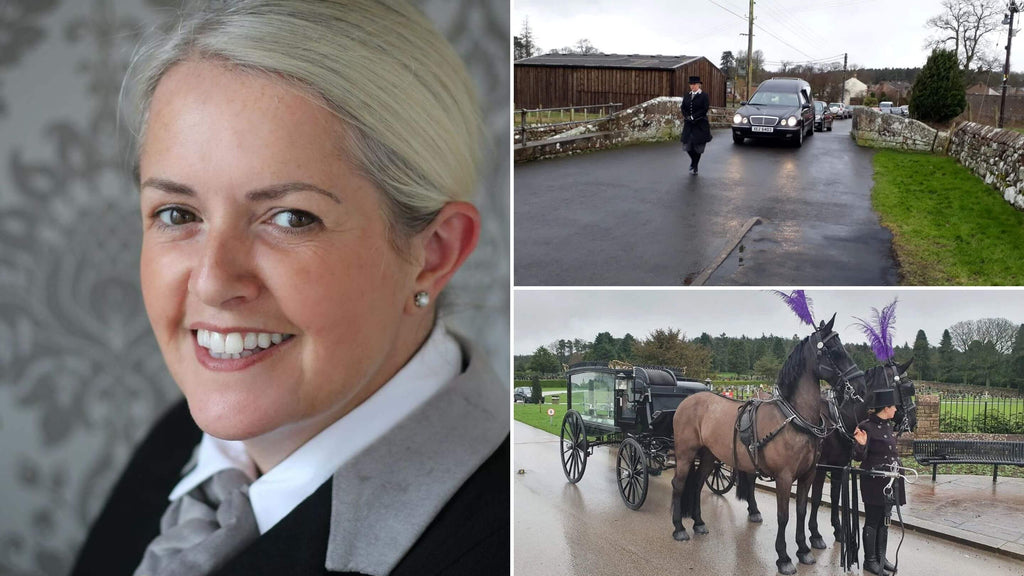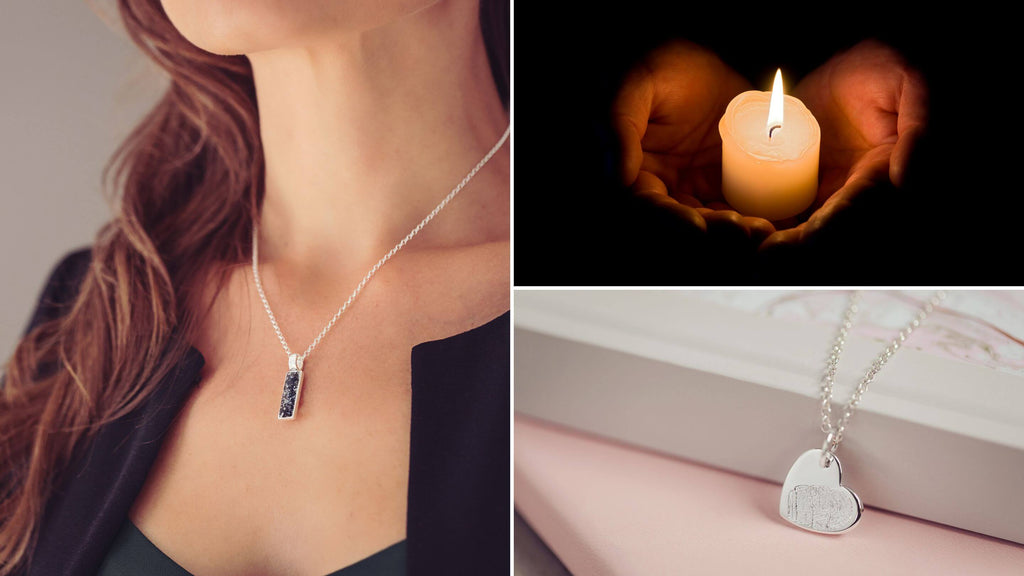A funeral director is typically somebody who plans a funeral, following your
wishes. Families choose to work with funeral directors as it can give loved ones the space to grieve and organise other elements, knowing that the funeral arrangements are in hand. A good funeral director will make the grieving process easier and more bearable. Still, it can understandably feel like an overwhelming choice to make for those in the early days of processing the loss of a loved one.
At Hand on Heart, we work with more than 100 funeral homes in the UK and
Ireland. Those funeral homes offer our ashes memorial jewellery and memorial fingerprint jewellery to people looking for beautiful and unique ways to remember their loved ones. As a result of this partnership, we have a good idea of funeral directors’ essential roles in the grieving process. We thought it might be helpful to our customers to explore the subject and answer any questions. So, we sat down with independent funeral director Jill Glencross, who offered some fascinating insights into the work of funeral directors.

Firstly, thanks so much for taking the time out of your busy day to chat with
us, Jill. We’d love to get started by hearing about what you feel is your most
important role as a funeral director?
The role itself is so varied, but the most important aspect is listening and genuinely caring. Having your family feel they are the only family you are caring for at that moment. I make sure I’m available all the time, whenever they need me, to answer any questions they might have. But it isn’t just the preparations and the funeral itself, it’s also after the funeral when everyone else has gone back to ‘normal’ – this is when families need support. This was one of the reasons I started our monthly social group.
Could you talk us through what happens in a Funeral Home each day?
Oh gosh, my day can change with a phone call. I could be going to meet a family
to make funeral arrangements, dropping off an order of service for a family who
don’t have facilities to look at the draft online, collecting clothes for a loved one,
going to the hospital to bring a loved one into our care, or helping to choose a
grave. Typical activities at a funeral home include daily funerals and the interment
of ashes. Of course, there are everyday tasks like cleaning the chapel (including the loo), typing newspaper notices, and doing a recce to plan timings for the route of a funeral. There’s also coffin making, chapel visits, ordering flowers, sorting funeral teas, and updating our own Facebook page. The list is endless, and the days are long – I work about fourteen hours most days. I also have two children (the youngest being 14).
Can you help a family make a funeral completely personal to their loved one?
100% we can – we believe every funeral should be completely unique. You only
get one chance to get it right.
Should funeral directors be able to help with non-religious funerals or those
from a variety of faiths?
Definitely, we can do anything a family requires or requests.
Costs of funerals can often be a concern of families. Do funeral directors offer payment plans?
We offer funeral plans with Golden Charter for pre-paid funerals, and we can
provide finance for funerals. Families can also claim with the DWP (Department
for Work and Pensions) for help with funeral costs.
Can families ask for a full breakdown of costs?
Yes, we give our families estimates, and all costs are broken down on this.
Do funeral directors offer what might be considered a ‘standard’ package?
Yes, we can do as straightforward a funeral as a family want – even what is called a ‘direct cremation.’ Or we can organise them to be as ‘out there’ as possible.
Sometimes the volume of paperwork can feel understandably overwhelming
for loved ones who are grieving.
Would a funeral director help a family with the necessary paperwork and documents?
Absolutely, we complete all of the paperwork for our families. There are also
different forms for burial and cremation. For example, in the case of a burial, there
will be an application form to purchase a new grave or to reopen an existing plot,
and the existing Deeds will usually be required. If the coroner is to hold an inquest, there will be no ‘green form’ (typically issued by the registrar to the funeral director). Instead, the coroner will issue paperwork to the funeral director, registrar and cemetery office.
Are qualifications important as a funeral director?
I believe accreditation of the premises and/or business is more important than
qualifications as a funeral director. I have vast experience and knowledge that is
invaluable, gained from working in pathology for 24 years.
In terms of accreditation, for example, we are both SAIF and NAFD accredited.
For context, we are the only funeral directors in Carlisle (the location we’re based)
to be accredited by both. SAIF (The Society of Allied and Independent Funeral Directors) promotes best practices and protects the interests of its members and their local communities. All prospective members have their premises inspected, and everyone who joins must adhere to a strict Code of Practice. I mentioned earlier that our care and support for families extends after the funeral. Part of this is due to us being members of SAIF Care. This means we can offer our families free bereavement support from the minute we meet them to whenever they need it in the future. This is provided by trained staff over the telephone, via email or face to face.
The NAFD (National Association of Funeral Directors) represents a broad
spectrum of funeral-directing businesses, from the smallest independent family
firm to the largest corporate companies. The NAFD has been dedicated to
maintaining the highest standards throughout the funeral profession to ensure
bereaved families receive the advice and support they need and deserve. Every
member’s funeral home is inspected every two years by quality managers, and they are required to abide by their code of practice.
What does continuity of care mean to you as a funeral director, and why is it
important?
Continuity of care is extremely important to me. From that first call, our families
deal with the same funeral director the whole way through the process – from the
first arrangements to the day of the funeral and beyond. We treat our families like
our own family. We have also created a monthly social meet-up so our families
know we are still there for them, and everyone is welcome.
What kind of questions are you asked by families when they are choosing a
funeral director?
Typically, we find that the only questions families ask if they haven’t chosen
already are about costs. Most families have already decided they want us when
they call. However, if people are considering which questions to ask, I’d
recommend asking about what matters to you and what might help you find out
more about a funeral director. For example, asking whether there will be one
person looking after them throughout their experience. (Our families have the same funeral director throughout the process, but other funeral homes might not). They might have questions about policies such as embalming, environmental impacts, lists of celebrants, organising music or donations to charity. No question is too big or too small – we’re always happy to help!

How have you found working with us at Hand on Heart Jewellery to offer
bespoke memorial jewellery to the families in your care?
We think Hand on Heart are amazing. It’s fantastic that you’re also local to us, and
you produce a very high standard product. We’re delighted to be working with
you!
We’d like to say an enormous thank you to Jill for taking the time to sit down with
us for this fascinating chat about life as a funeral director and what happens in a
funeral home. We hope this has helped answer any questions or explore any issues you might have when choosing a funeral director.
If you are a funeral director, you can also learn more about our services and the
benefits of working with Hand on Heart Jewellery here.

